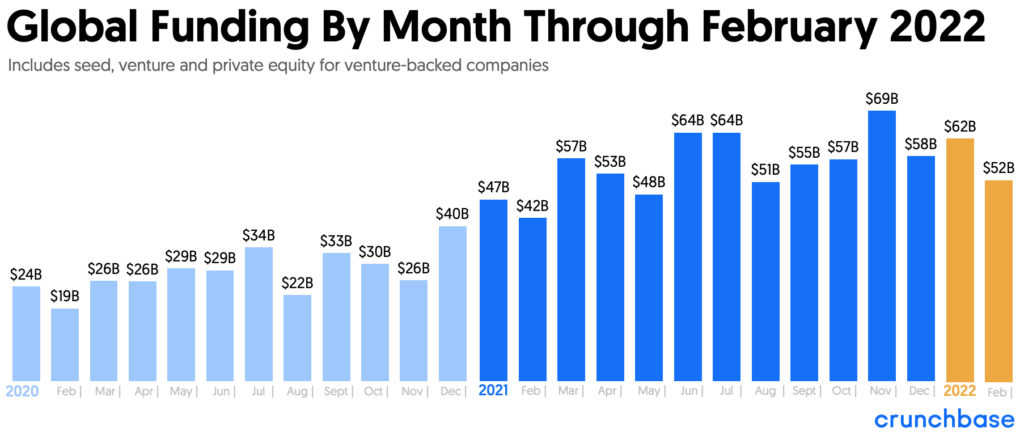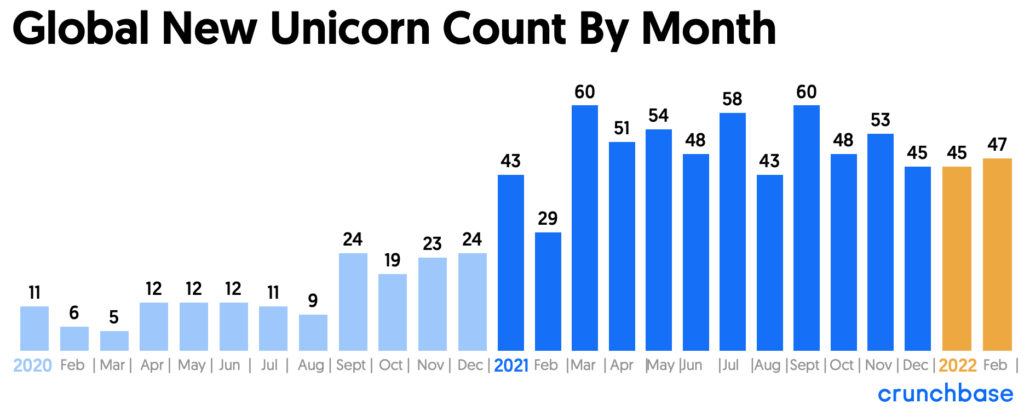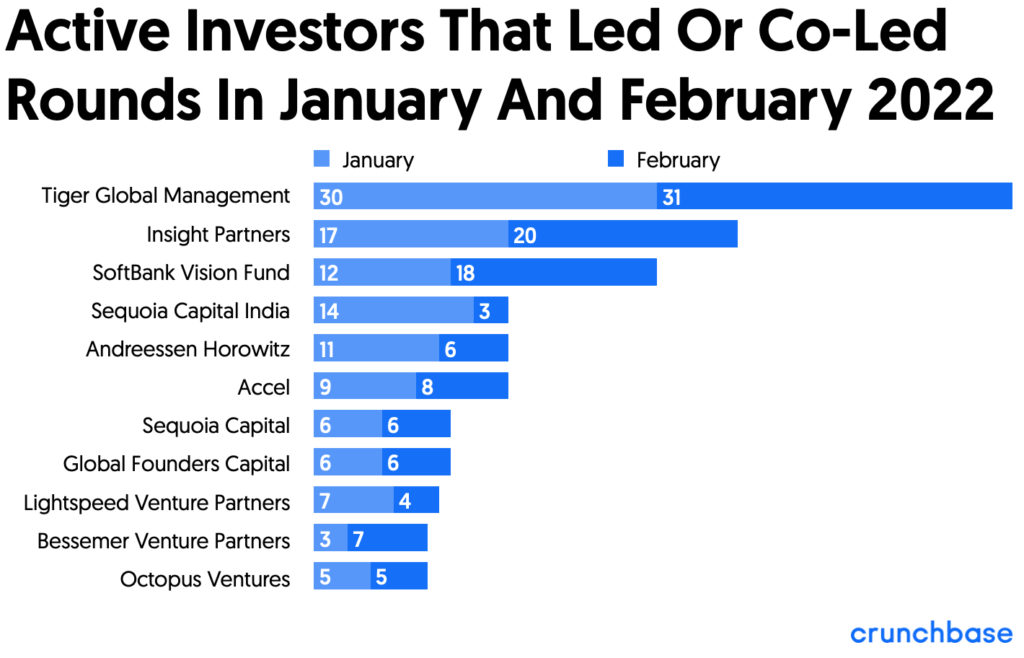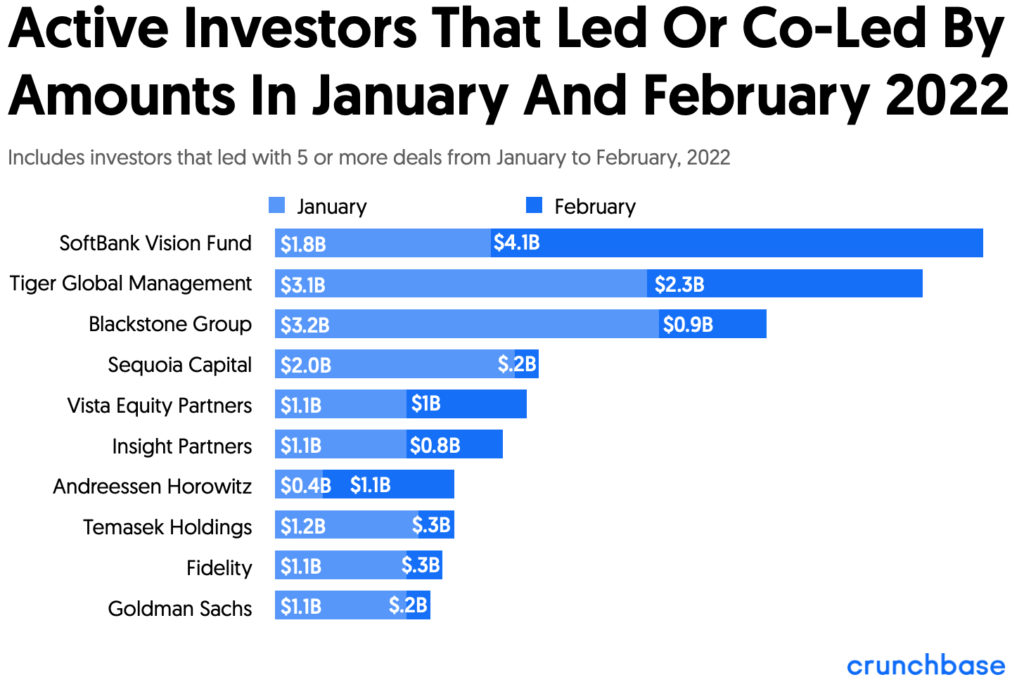Global venture funding in February 2022 fell by $10 billion month over month, clocking in at $52 billion, based on an analysis of Crunchbase data, as startup investors seem to be coming off last year’s highs and assessing the impact of the Ukrainian conflict, record inflation and public-market turmoil.
But it’s worth keeping in mind that startup funding last month was still up year over year compared to February 2021 by $10 billion—a 24 percent increase. And funding in the past month was not far below the 12-month average of $55 billion we saw in 2021, a period in which annual venture funding soared 100 percent compared to 2020.

When funding dips month over month, we typically expect it to be dominated by a cutback in late-stage funding along with a slowdown in investing pace by growth investors. What we found instead was that seed-stage funding grew slightly month over month, while early-stage funding fell 17 percent, and late-stage funding dropped 19 percent.
Search less. Close more.
Grow your revenue with all-in-one prospecting solutions powered by the leader in private-company data.
This suggests some small amount of caution has begun to creep into early- and late-stage venture investing compared to previous monthly highs.
Unicorn board keeps growing
New unicorn company creation kept pace in February. All told, 47 companies joined The Crunchbase Unicorn Board last month, up from the 29 new unicorn companies that joined in February 2021.
Companies that joined the board last month include Finland-based logistics company RELEX Solutions in a round led by Blackstone Group that valued the company at $5 billion; U.K.-based payments company GoCardless via a late-stage funding led by Permira; and California-based Bloomreach, a customer product data platform, via a round led by Goldman Sachs.

Growth funds lead
As the public markets took off in 2021, the most active investors in tech startups leading post-seed rounds—as well as by dollars invested—tended to be growth investors who doubled down on private technology companies, racking up large numbers of new portfolio companies.
The three most active—Tiger Global, Insight Partners and the SoftBank Vision Fund—didn’t slow down in January or February of 2022, even as many technology stocks have taken a battering, negatively impacting those firms with a public equities business invested in public technology stocks.

Although they led startup investment last year, leading venture and growth-equity firms do not necessarily lead large rounds every month.
Still, it remains to be seen whether a pullback is on the horizon. One metric that could foreshadow that: Sequoia Capital, Temasek, Fidelity and Goldman Sachs led fewer rounds above the $100 million mark last month compared to monthly investments led in 2021, per Crunchbase data.

Billions in funds
Growth-equity firms have continued to raise multiples of billions in funds targeted toward private companies. Last month, Insight Partners announced its 12th fund, raising its largest to date at $20 billion. Tiger Global in the same month closed on fund 16 at $11 billion, also its largest to date.
Insights’ prior fund was raised over two years ago in November 2019 at $9.5 billion. Tiger’s fund is notable as it came within four months of the firm announcing in October 2021 its fund 15 of $8.8 billion. It announced fund 14 in January 2021 at $6.7 billion.
With record funds raised by both growth equity and venture at all stages, the appetite for investments into private companies is not going away, though some firms are treading more cautiously. But notably, both Coatue and General Catalyst, who were very active in 2021, have cut back on the number of rounds they have led so far in 2022, per Crunchbase data.
Record-setting
For four months in 2021—January, March, June and November—new monthly funding records were set for venture investment. But the record-setting months of last year might well be in our rearview mirror as investors become a little more cautious in awarding funding to startups.
Still, the interest in investing in private companies—from a larger array of investors beyond the venture industry—is not going away. In fact, the competition to invest earlier seems to be increasing with Tiger Global’s partners reportedly setting aside a billion dollars of their own cash for investment in seed-stage funds to increase access to companies earlier in their funding cycles.
While the record-setting pace of venture investing may be slowing down from 2021’s tremendous highs, moves by deep-pocketed growth investors into the earlier stages of funding could actually increase competition to back younger startups and boost valuations at the earlier stages of venture.
Illustration: Dom Guzman

Stay up to date with recent funding rounds, acquisitions, and more with the Crunchbase Daily.





![Illustration of stopwatch - AI [Dom Guzman]](https://news.crunchbase.com/wp-content/uploads/Halftime-AI-1-470x352.jpg)
![Illustration of remote meet on cellphone, unicorn chess piece and money. [Dom Guzman]](https://news.crunchbase.com/wp-content/uploads/business-strategy-470x352.jpg)
![Illustration of a guy watering plants with a blocked hose - Global [Dom Guzman]](https://news.crunchbase.com/wp-content/uploads/quarterly-global-3-300x168.jpg)
67.1K Followers